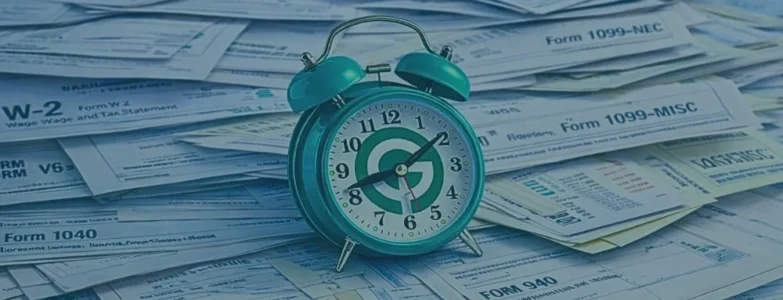By The Guillen Pujol CPAs Newsroom
The Tax Court rejected the Dealers Auto Auction of Southwest, LLC’s software-malfunction claim, citing repeated noncompliance and inadequate oversight as key factors in the ruling.
Key Takeaways: IRS Penalties Against LLC Over Form 8300 Compliance
- The IRS penalized a Phoenix-based LLC, after it failed to file required Form 8300 reports for large cash payments in 2016—despite relying on software it believed would ensure compliance.
- The Tax Court upheld the $118,140 in penalties – and rejected the LLC’s software malfunction defense, citing poor internal controls and repeated evidence of noncompliance.
- LLCs and other businesses must file Form 8300 within 15 days of receiving over $10,000 in cash – single or related transactions.
- Since January 1, 2024, businesses filing 10 or more information returns annually must e-file Form 8300 through FinCEN, or face penalties reaching $250 per violation, up to $3 million per year.
- Advice is easy to find—representation isn’t. Only a licensed CPA can interpret IRS rules, catch filing gaps, and represent you and your business when it matters. While AI tools may offer generic suggestions, they cannot assume liability or stand beside you before the IRS. Hiring a CPA firm remains one of the smartest decisions your business can make.
In a recent Tax Court ruling that has sent a strong message to business owners and LLCs across the United States, Dealers Auto Auction of Southwest, a Phoenix-based auto dealership, had $118,140 in IRS penalties upheld for failing to report large cash transactions under Section 6050I of the Internal Revenue Code.
The case, Dealers Auto Auction of Southwest, LLC v. Commissioner, T.C. Memo. 2025-38, centered on the dealership’s failure to file Form 8300—an IRS information return required for businesses receiving over $10,000 in cash in a single or related transaction. Although the company argued that its software failed to identify these filing obligations, the Tax Court was unconvinced.
Cash Transactions Require Reporting—No Exceptions for Software Gaps
Between 2014 and 2016, the Phoenix-based LLC received numerous customer cash payments exceeding the $10,000 threshold. While the company filed some Forms 8300, the IRS determined that it missed at least 266 additional filings for 2016 alone, which led to a total penalty of $118,140, the Journal of Accountancy reported. The LLC blamed this on its AuctionMaster software, which was marketed as capable of tracking such payments and preparing the necessary forms.
But the Tax Court found no evidence of a system error, nor did the dealership demonstrate that it had inputted the right data. The software could prepare forms, but it wasn’t designed to file them automatically—the Tax Court noted. As stated in Bunney, 114 T.C. 259, 267 (2000), “[T]ax preparation software is only as good as the information one inputs into it.” (Journal of Accountancy, Aug 1, 2025.)
Worse, the company’s records showed a significant decline in Forms 8300 filed—just 116 in 2016 compared to 212 in 2014—yet it failed to question or investigate the discrepancy.
Reasonable Cause Rejected
Under Section 6724, businesses can avoid penalties if they show their failure was due to “reasonable cause” rather than willful neglect. But the court ruled Dealers Auto Auction of Southwest, LLC failed to meet this threshold. It had a prior history of noncompliance, lacked sufficient internal controls, and waited until an IRS audit to address the issue.
The ruling reaffirms that reliance on software—without manual oversight or internal safeguards—is not a defense against reporting obligations. Only a licensed CPA can provide the qualified oversight, regulatory insight, and procedural discipline needed to avoid penalties of this magnitude. For LLCs and other businesses handling high-volume cash transactions, routine review by a CPA firm is a critical layer of legal protection.
Form 8300 Compliance: What LLCs and Businesses Must Know
Any U.S. business that receives more than $10,000 in cash—whether in a single transaction or in a series of related ones—is required to file Form 8300 to report cash payments within 15 days, per the IRS. This includes LLCs, corporations, and sole proprietors in industries ranging from auto sales to construction, hospitality, and jewelry.
As of January 1, 2024, businesses that file at least 10 information returns per year must e-file Form 8300 through FinCEN. Failure to file—or to furnish required statements to customers—can result in fines of $250 per violation, adjusted for inflation, and up to $3 million annually.
In this case, the penalties were substantial: $12,100 under Section 6721 for failure to file, and $9,100 under Section 6722 for failure to furnish payee statements, plus $118,140 in additional fines tied to 2016 violations.
Navigating Form 8300 reporting rules without guidance from a licensed CPA exposes businesses to significant risk—missed filings, incomplete documentation, and potentially steep IRS penalties. As electronic filing becomes mandatory and enforcement intensifies, a CPA firm does more than submit forms; it builds the infrastructure to monitor compliance, verify accuracy in real time, and provide confidential tax representation before federal authorities. While artificial intelligence tools and online forums may offer generic answers, they cannot assume liability, ensure regulatory compliance, or represent you in an audit. The cost of professional guidance is often a fraction of what preventable mistakes can ultimately incur.
Takeaways for LLCs and Business Owners
The Dealers Auto Auction of Southwest, LLC’s case highlights a critical point: Form 8300 reporting is not optional, and delegating compliance to software or staff without appropriate controls carries real financial risk.
If your business receives cash payments—or handles transactions near the threshold—consult with a CPA immediately to ensure you are meeting federal and state filing obligations. Establish robust internal controls, track all qualifying payments, and file forms on time. A compliance misstep, even an unintentional one, can lead to severe penalties.Unsure whether a transaction triggers Form 8300? Err on the side of caution and speak to a licensed CPA firm familiar with IRS information return rules. At Guillen Pujol CPAs (GPCPAs), we specialize in Form 8300 compliance, IRS representation, and regulatory strategy. We help businesses navigate these complexities with precision, discretion, and authority. Schedule your consultation with us today: https://guillenpujol.com/book-a-consultation/
Take Action Now: Need professional tax guidance? Contact us today.
Planning Tomorrow, Together, with GPCPAs.
Trusted by Businesses Worldwide
Editor’s Note: This post is part of the ‘GPCPAs Info Hub,’ an initiative dedicated to empowering you with the knowledge and strategies needed to navigate the complexities of the U.S. tax system and financial strategies. Visit our Information Hub, a curated resource offering the latest in tax, economic, and business news, alongside actionable guidance on tax strategies, accounting, and business advisory—because Planning Tomorrow starts here.
- AI, Tax Risk, and Professional Judgment: Why Automation Alone Can Increase IRS Exposure
- 2026 Tax Calendar: Your Guide to IRS Deadlines All Year
- How Realtors Can Reduce Their Taxable Income Through Smart Entity Selection and Advanced Tax Planning
- After the Shutdown: How IRS Cuts Continue Affecting Taxpayers
- IRS Tax Brackets for 2026: What Business Owners Need to Know











